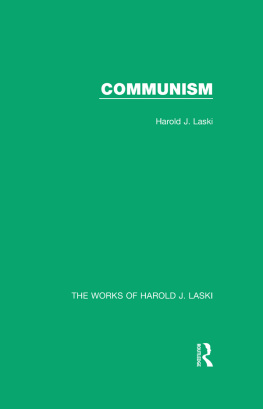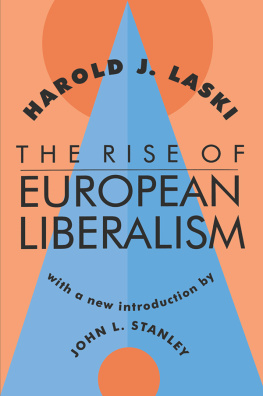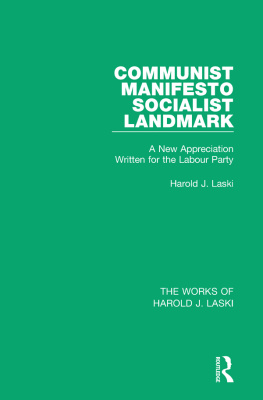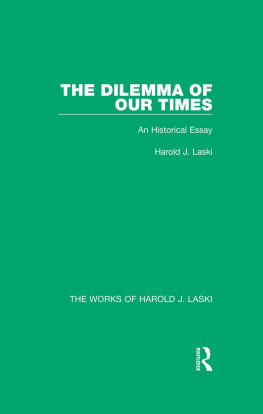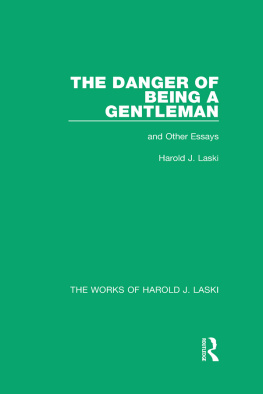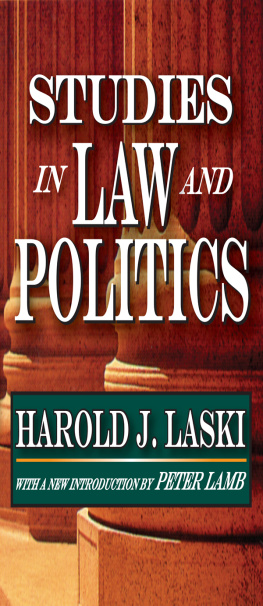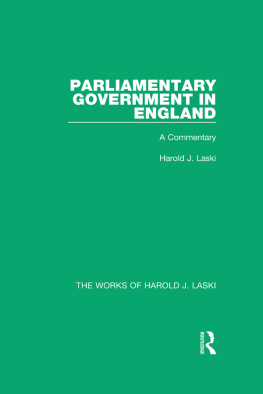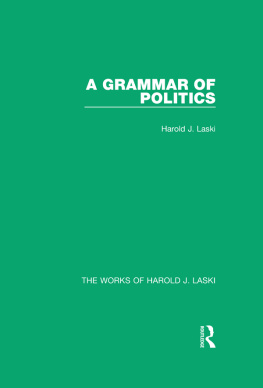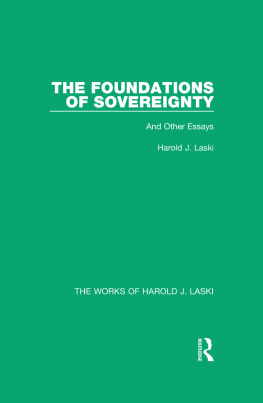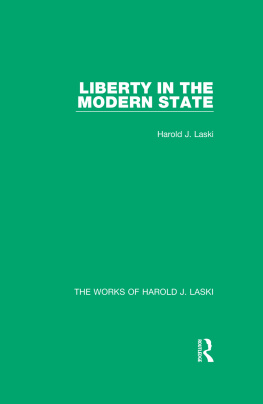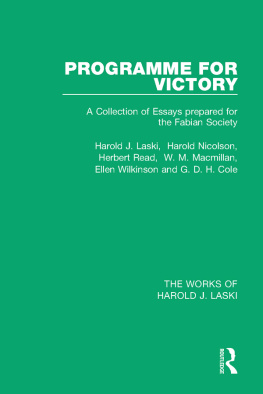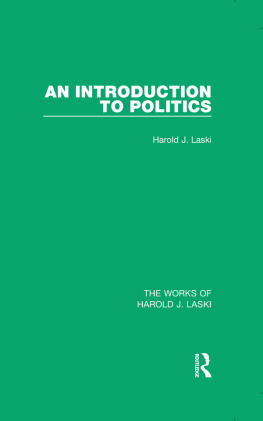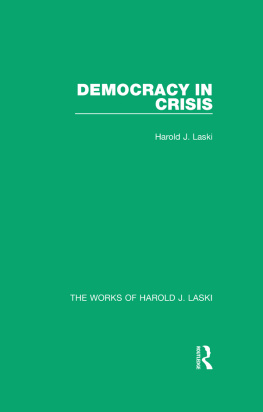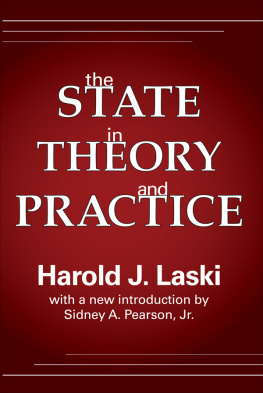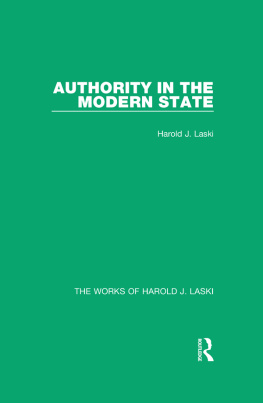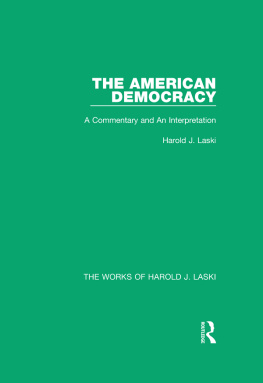THE WORKS OF HAROLD J. LASKI
Volume 5
COMMUNISM
First published in 1927
This edition first published in 2015
by Routledge
2 Park Square, Milton Park, Abingdon, Oxon, OX14 4RN
and by Routledge
711 Third Avenue, New York, NY 10017
Routledge is an imprint of the Taylor & Francis Group, an informa business
1927 Williams & Norgate, Ltd.
All rights reserved. No part of this book may be reprinted or reproduced or utilised in any form or by any electronic, mechanical, or other means, now known or hereafter invented, including photocopying and recording, or in any information storage or retrieval system, without permission in writing from the publishers.
Trademark notice: Product or corporate names may be trademarks or registered trademarks, and are used only for identification and explanation without intent to infringe.
British Library Cataloguing in Publication Data
A catalogue record for this book is available from the British Library
ISBN: 978-1-138-81912-2 (Set)
eISBN: 978-1-315-74273-1 (Set)
ISBN: 978-1-138-82198-9 (Volume 5)
eISBN: 978-1-315-74264-9 (Volume 5)
Publishers Note
The publisher has gone to great lengths to ensure the quality of this reprint but points out that some imperfections in the original copies may be apparent.
Disclaimer
The publisher has made every effort to trace copyright holders and would welcome correspondence from those they have been unable to trace.
First printed April 1927
Reprinted, June 1927
PRINTED IN GREAT BRITAIN
TO
L. T. HOBHOUSE
AND
M. GINSBERG
PIQNUS AMIOITI
PREFACE
No book on communism can hope to be impartial, for its problems are too urgent not to involve some bias, however unconscious. I can only say that I have sought so to state the communist theses upon the topics I have discussed that its own advocates would (as I hope) recognise that even an opponent can state them tairly. Whenever italics are given in a quotation, they are reproduced from the original.
The bibliography has presented many aiffi-culties. After many attempts I have simply given a list of books that are essential to the understanding of communism. For fuller references the bibliography cited will be found of great value.
I desire to acknowledge the help I have derived, in writing , from the Master of Balliols little book on Marxs Capital. I know no volume in English that better explains the purpose and limitations of its theme.
H. J. L.
The London School of Economics
and Political Science.
1st December, 1926.
CONTENTS
COMMUNISM
I
COMMUNISM has become, in our own day, at once an ideal and a method. As an ideal, it aims at a society in which classes have been abolished as a result of the common ownership of the means of production and distribution. As a method, it believes that its ideal can be attained only by means of a social revolution in which the dictatorship of the proletariat is the effective instrument of change.
As an ideal, communism has an honourable tradition which reaches back to the very beginnings of Western political thought. The Republic of Plato already envisages a commune ist State; and, since his day, there has hardly been a generation in which some thinker, oppressed by the social consequences of private property in the means of production, has not sought to remedy them by its abolition. All political literature, indeed, until the Heformation, is full of doubts of the moral validity of private property; it is only since that time that economic individualism, in any full and unmitigated sense, has asserted its full sway over the minds of men. For the previous eighteen hundred years, the Stoic notion of the equality of mankind deposited an uneasy belief that its consequences should manifest themselves in the sphere of economic fact. That there was communism in the golden age was taken almost for granted; and when that period was equated by Christianity with the time before the Fall, what was to become the classic theology of Western Europe became impregnated with a similar faith. Accordingly, the Roman Lawyers, the New Testament, the early Fathers and the mediaeval Schoolmen all found it difficult to defend an economic system in which some men could suffer from privation, while others prospered. If most took refuge in the facile and convenient doctrine of stewardship, and accounted for private property by the tragedy of the Fall, there remained many who could not suffer this compromise. Nor did the modified Aristotelian view of Aquinas find universal favour. The medival records contain indubitable traces of men and sects, often obscure enough, who preached a thoroughgoing communism. The strict followers ot St. Francis, the Beguins and the Beghards, John Ball and his disciples in 1381, are merely examples of a widely-spread temper. It is not too much to say that at every mediaeval period of social crisis, some men will be found to declare that the only radical cure for oppression is the abolition of private property.
Yet we must not make too much of this mediaeval communism. For the most part, and naturally enough, it is less a coherent body of social doctrine than a reflection of the other-worldliness of the Middle Ages. That is obviously the case with the oft-discussed communism of Wycliff; the friend of John of Gaunt cannot seriously be regarded as the considered ally of social revolution. What we are confronted with is rather a fine distaste for materialism, a sense that the rich man cannot enter the kingdom of heaven, a cri de cur against the rigidity of feudal structure, than a genuine social philosophy.
Much the same is true of communist teaching in the period between the Reformation and the French Revolution. That of Sir Thomas More is clearly no more than the attractive fancy of a great humanist, depressed by the economic evils of the time. Gerard Win-stanley and his disciples in Cromwellian England, indeed, represent a genuinely communist view. From each according to nis powers, to each according to his needs is no unfair summary of the Law of Freedom in a Platform (1652). Co-operative produotion, the abolition of exchange, the idea of the necessary quota of labour which each must perform under penalty, all the regular incidents of Utopian communism are there. But Winstanley, like so many idealists, is clearer about the aims he has in view, than the methods by which he proposes to attain them. He realised the importance of education, and the study of natural science; he has that sense of the possibility of changing human nature which is the foundation of reforming creeds. But the inner light which drew him to Quakerism did not shine brightly among the practical Puritans of his day; and his little band of Diggers on St. Georges Hill are important in the history of thought rather than of action.
We cannot here seek to narrate the history of communism before the Industrial Revolution; it must suffice merely to give instances of the permanence of the ideal. That the grim economic facts of eighteenth-century France should have led men of sensitive temper to this view is intelligible enough; the contrast between the extremes of luxury and poverty was too glaring for its meaning to be missed. The poor parish priest Meslier, for example, was driven to communism by the horrors he encountered among his flock. You are amazed, O ye poor, he cried, that ye have so much evil and suffering in your lives, if, as I desire, all possessions were common, there would be no taxes to fear. Meslier protests with bitterness against the monst rous tyranny under which society groans; and he sees no remedy save in revolution. But he has little to say of its coming save to urge that men have the power in their hands if they will but show the courage and the will. His

